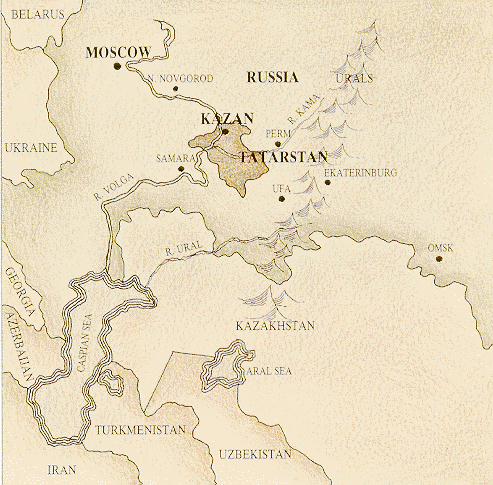 Russian
RussianKazan is the capital of the Republic
of Tatarstan, one of the largest economic, scientific, cultural
centres of our country and an ancient city. It is situated on the great
Volga river. At the beginning of the third millennium the city is going
to celebrate 1000 years of its foundation.
"Kazan" in Tatar means "cauldron".
The place where the city is situated reminds of a hollow, a cauldron. According
to a popular legend, one of the khans dropped a cauldron here in the stream
of Kazanka river and people began to call the area "the place of a cauldron".
By the end of the first millenium
AD the place where modern Kazan is situated was the northern frontier
of the state of Bolgars. In the 15th century Kazan became the capital of
the principality, and in the 15th century - the capital of the Kazan Khanate.
In October 1552 Ivan the Terrible captured Kazan and the city was nearly
razed to the ground and burnt. In 1556 construction of the white-stone
Kazan Kremlin started. Gradually the city is restored and begins to look
like many other Russian towns. Kazan, being a military fortress, turns
to a huge trade, industrial and administrative centre of the region. In
1708 Kazan becomes the centre of the vast Kazan province that initially
occupied nearly half of the European part of Russia. Its advantageous economic
position helped the city to grow. By the middle of the 19th century Kazan
is finally formed as a city-building entity. Kazan becomes a centre of
the military, educational, mail districts, of the judicial circuit
and the circuit of water ways transportation. The city was destroyed and
burnt several times, built anew and restored. On May 27th, 1920 the city
became the capital of the Tatar Autonomous Soviet Socialist Republic. Today
Kazan is the capital of the Republic of Tatarstan.
The city has a state award
- the Lenin Order.
Kazan is classified as class
"A" of the historical and cultural value (the same as Moscow and
Saint-Petersburg). The border of the historical centre of the city nearly
coincides with the city line of Kazan of the year 1890 with the area of
1700 hectares that makes around six per cent of the territory.
The city is bound to the names
of G. R. Derzhavin, A. S. Pushkin, L. N. Tolstoy, G. Tukay,
S. Mardzhani, K. Nasyri, N. I. Lobachevsky, K. Fuks, N. M.Butlerov,
F. I. Shalyapin, V. I. Katchalov, G. Iskhaki,
M. Maksudi, M. Dzhalil and many others.
Today the population
of the city is 1 million 200 thousand people. 40,7 per cent are young people
under 30 years of age. Representatives of more than 101 nationalities live
in Kazan, 22 national cultural centres are organised.
Kazan is split into 7
administrative units where more than 140 huge industrial enterprises are
situated (“Kazan Organic Synthesis” joint stock company, “Kazan helicopter
plant” joint stock company , Kazan aircraft production merger named after
S. P. Gorbunov, “Kazan mechanical optics plant” joint stock company, “Kazan
medical instruments plant” joint stock company, «Teplokontrol» industrial
merger etc.)and more than 70 thousand medium and smaller enterprises. Kazan
is a port of five seas, an important airways, railroads and motorways junction.
Tramways, trolley-bus and bus routes run for 835 km. The metro is under
construction.
Beginning from 1996 В«The
program of elimination of dilapidated apartment houses and reconstruction
of dilapidated apartment blocksВ» adopted by the President of the Republic
of Tatarstan M. S. Shaimiev is being successfully implemented. The program
planned until 2004, undertakes gradual, step by step reconstruction of
apartment houses of the capital, moving of 32 thousand people to new flats.
For this purpose within three years 90 houses have been built with the
total area of 571 200 square meters.
According to the level of gasification Kazan
is among the first ten cities of Russia.
There are 7 theatres,
8 cinemas, 30 higher educational institutions, the Academy of Science of
the Republic of Tatarstan, Kazan Centre of the Academy of Science of the
Russian Federation, a network of special schools, the National Library.
In 1804 Kazan state university was founded. It became the third one after
Moscow and Saint-Petersburg universities.
Until now Kazan has preserved
the position of an important cultural centre of the Volga region. Every
year the Chaliapin International Opera Festival and Nureyev Ballet Classics
Festival take place in the city. Today they gain great popularity around
the world.
The city provides best conditions
for developing different sports and tourism. This gives opportunities to
enter the Super League and the High League for such teams as В«Ak BarsВ»
(ice hockey), that became the Champion of Russia in 1998, В«Uniks-LokomotivВ»
(men basketball), В«KAI-TacitВ» (hand ball), В«RaketaВ» (ball hockey), В«PrivolzhaninВ»
(mini-football) etc. В«RubinВ» football team entered the First League.
On May 8th, 1999 Kazan
yachtsmen came back from a round-the-world adventure that started on board
the В«North StarВ» yacht from the pier of Kazan river port on August 30th,
1997.
Kazan is a city of many
confessions where representatives of various religions live friendly. There
are 23 mosques, 16 orthodox churches, a Lutheran one and a catholic one,
Judaic synagogue, prayer houses of the Seventh day Adventists, bakhai,
Krishna.
Kazan is a city of a
very advantageous geographic position. For long it’s been a trade intermediary
between the East and the West and now the city plays a prominent role in
political, economic and international relations.
Kazan is a unity of the great historical past, glorious
present and even more splendid future.